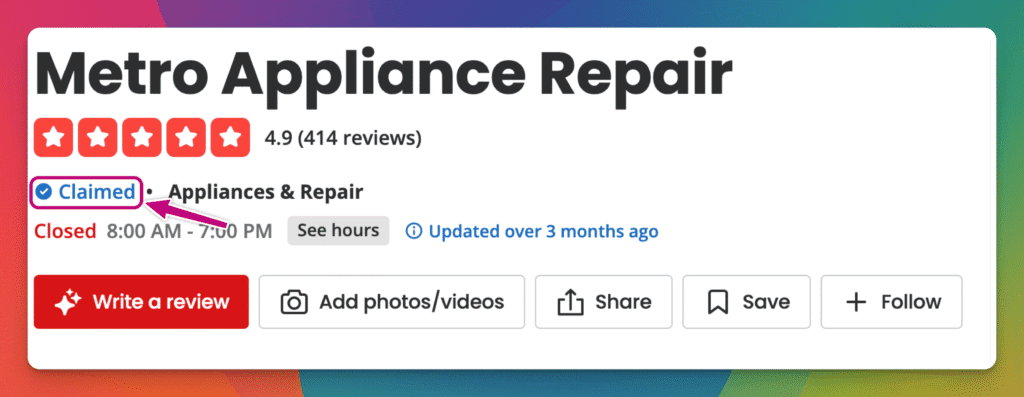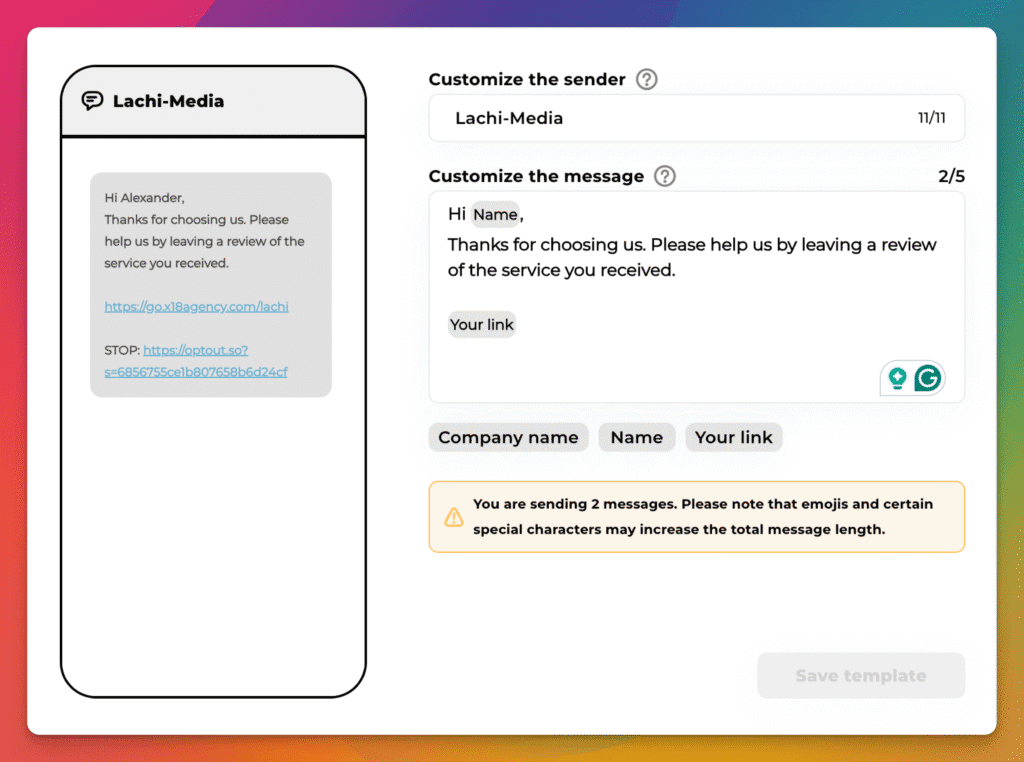Last Updated on September 19, 2025
If you run a local home services business, plumbing, HVAC, garage door repair, landscaping, appliance repair – there’s a good chance potential customers are checking you out on Yelp before picking up the phone.
And if your Yelp profile isn’t properly optimized, you’re leaving money on the table.
In 2025, Yelp remains a critical platform for attracting local leads, building trust, and generating high-converting calls. But ranking high on Yelp isn’t just about collecting reviews. Yelp has its own algorithm, and understanding how to work with it is key to getting seen by the right customers.
This guide will walk you through Yelp SEO strategies that actually work, so you can show up more often, earn more trust, and drive more business.
1. Claim and Verify Your Yelp Business Profile
Before you can optimize anything, you need to take control of your listing.

Why claiming matters:
- Ensures all info is accurate and up to date
- Gives you access to backend tools (insights, messaging, ad options)
- Prevents others from editing your business details
To claim your business:
- Visit business.yelp.com
- Search for your business name and location
- If it’s already listed, click “Claim this business”
- If it’s not listed, follow the steps to add it
Make sure your business name, address, and phone number (NAP) match exactly across Yelp, your website, and other directories like Google Business Profile and Bing Places. Consistency is a key local SEO signal.
2. Choose the Right Yelp Categories for Your Business
Yelp lets you choose up to three business categories, and these help users find you when they search for services.
How to pick the best categories:
- Be specific: Use “Water Heater Installation” instead of just “Plumber”
- Think like a customer: What would someone search for when needing your service?
- Avoid irrelevant categories just to gain visibility. It can (and probably will) hurt rankings in a way that eventually gets you less traffic overall.
You can update your categories by logging into your Yelp business dashboard and clicking “Edit Business Information.”
3. Optimize Your Business Description with Local Keywords
Your business description is one of the few places Yelp allows you to include text content – use it wisely.
Where to include keywords:
- Introduction paragraph (e.g., “We’re a Dallas-based HVAC company…”)
- Services list (e.g., “Air duct cleaning, furnace repair, emergency AC service”)
- FAQs or “From the Business” section
Make sure to use natural language. Yelp is sensitive to keyword stuffing and may filter your profile or reviews if it detects spammy practices.
Don’t: “We’re the best Dallas plumber for Dallas plumbing in Dallas.”
Do: “For over 10 years, our Dallas-based plumbing company has helped homeowners with everything from water heater repairs to emergency pipe bursts.”
4. Upload High-Quality Photos That Convert Browsers Into Buyers
Yelp profiles with 10 or more high-quality photos get up to 12 times more customer leads, according to Yelp.
Types of photos that work best:
- Your team on the job
- Before-and-after shots (especially for services like garage door or chimney repair)
- Vehicle fleet or branded uniforms
- Office or storefront
- Certifications, awards, or trust badges
Yelp encourages frequent photo updates. Aim to upload new images every month to keep your profile active.
Tip: Add descriptive captions with subtle keyword placement, like “Our team finishing an HVAC install in Uptown Dallas.”
5. Encourage Ethical and Consistent Yelp Reviews
Reviews are the foundation of Yelp SEO. But Yelp also has one of the strictest review filters in the industry.
Avoid:
- Asking for reviews outright
- Offering discounts or incentives
- Creating fake reviews or having friends and family leave them
Instead:
- Use Yelp signage in your shop, trucks, or business cards
- Include a Yelp badge or link in your email signature
- Follow up with customers and say, “If you’d like to share your experience, you can find us on Yelp.”

Yelp favors reviews from users who have detailed profiles, leave reviews frequently, and add photos. Encouraging genuine feedback from real customers with active Yelp accounts will help your business rank higher and stay compliant.
We provide our clients with a tool that makes collecting Yelp reviews a lot easier. Reach out for more details.
6. Keep Your Business Info Up-to-Date
Businesses that keep their information current tend to rank better and convert more leads.
Review this information monthly:
- Operating hours (especially during holidays or for emergency services)
- Contact info and website URL
- List of services
- Areas served or zip codes covered
- Response time or 24/7 availability
Frequent updates signal to Yelp’s algorithm that your business is active and trustworthy.
7. Respond to Every Review, Whether Good or Bad
Engaging with reviewers shows that you care about your customers and take feedback seriously.
Best practices:
- For positive reviews: Thank them and mention a detail from their review
- For negative reviews: Remain calm, acknowledge the concern, and offer a professional resolution
Example response:
“Hi Sarah, thank you for your feedback. We’re truly sorry about the delay with your AC installation. We’ve addressed this with our dispatch team. If you’re open to giving us another shot, we’d love to make it right.”
Responding thoughtfully, especially to negative reviews, can build more trust than a perfect score with no context.
8. Track Yelp SEO Performance and Leads
Knowing what’s working is essential to improving over time.
Yelp’s dashboard provides:
- Customer leads (calls, clicks, messages)
- Profile views
- Review volume and rating trends
You can also:
- Track Yelp referral traffic in Google Analytics (Acquisition > Referrals)
- Use UTM parameters on your Yelp links to track site behavior
Evaluate what changes boost your visibility or conversion rate—whether it’s updated photos, new keywords, or more consistent engagement.
9. Combine Yelp SEO With Google Business Profile for Maximum Visibility
While Yelp and Google operate separately, they influence each other in the broader local SEO ecosystem.
Why integration matters:
- Many users check both platforms before choosing a provider
- Google crawls Yelp listings as part of your business footprint
- Matching NAP and business categories strengthens authority
- Schema markup on your website helps Google connect your Yelp presence with your brand
The more consistent and complete your presence across both platforms, the better your chances of ranking on both Yelp and Google Maps.
10. Don’t Try to Game the System with Fake or Purchased Reviews
One of the fastest ways to damage your Yelp presence is by buying fake reviews. Yelp has a highly sensitive review filter designed to detect unnatural review activity, and businesses caught soliciting or purchasing reviews may receive a public ‘Consumer Alert’ on their profile.
These warnings can severely hurt your reputation and reduce trust with potential customers. Worse, filtered reviews don’t count toward your overall rating or visibility. Instead of trying to manipulate the system, focus on earning reviews the right way—by delivering excellent service and making it easy for happy customers to find you on Yelp.
A side note: even if you don’t receive the alert on your profile, having too many “suspicious” reviews can really hurt your Yelp SEO.
A Quick Note on Yelp Ads
While Yelp Ads can increase your visibility on the platform by placing your business in sponsored results, they do not directly improve your organic Yelp ranking. Yelp’s algorithm separates paid listings from organic results to maintain credibility with users.
That said, ads can drive more traffic to your profile, which may lead to more calls, website visits, and even reviews—all of which can indirectly support long-term performance. If you’re considering Yelp Ads, view them as a way to amplify exposure, not as a shortcut to better organic visibility.
Conclusion: A Well-Optimized Yelp Profile is a Lead Magnet
Yelp is not just another directory—it’s one of the most trusted platforms consumers turn to when making purchase decisions for local services. With a properly optimized profile, your business can rise above competitors, build trust faster, and attract more qualified leads.
From claiming your profile to selecting the right categories, adding strategic keywords, encouraging genuine reviews, and actively managing your presence, Yelp SEO requires ongoing attention—but the payoff is well worth it.
Home service companies that invest in Yelp optimization often see measurable improvements in both visibility and revenue. Make Yelp an active part of your local SEO strategy, and you’ll turn it into a consistent source of high-intent leads.
Ready to get more out of Yelp? Reach out for a free local SEO audit, and we’ll show you exactly how to climb the local rankings and get better quality leads—on Yelp and beyond.